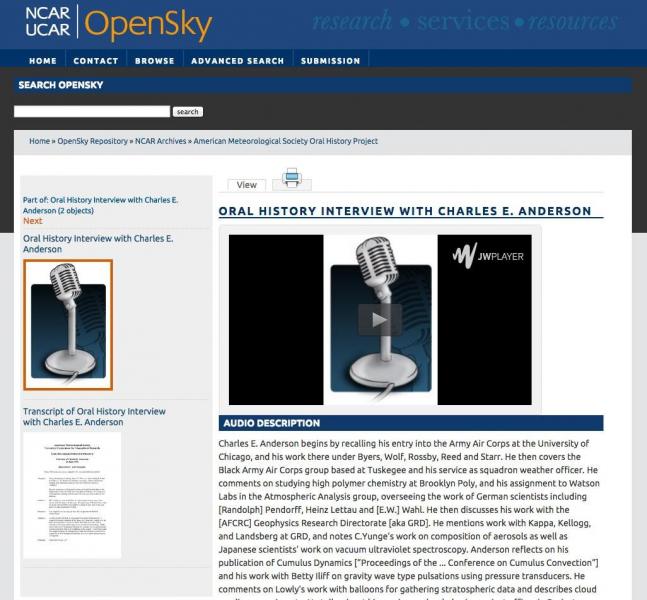- About Archives
- About SAA
- Careers
- Education
- Publications
- Advocacy
- Membership
At the National Center for Atmospheric Research (NCAR) Archives, we are striving to meet the challenges of fulfilling our users’ expectations in the digital age, especially around access to oral history collections. Beginning in the 1980s, NCAR joined with the American Meteorological Society (AMS) to create the AMS Oral History Project. The NCAR Archives created the NCAR/UCAR Oral History Project to collect interviews that fell outside the scope of the AMS project but were relevant to NCAR history.
The ultimate vision for both oral history collections is to capture the history of the atmospheric sciences and meteorology as told by the researchers, scientists, administrators, and others working in the field. The interviews are especially rich in conversations that capture the memories of those scientists who launched much of the innovative atmospheric and meteorological research in postwar America. Together these collections comprise over two hundred interviews and span fifty years. We continue to interview new people as funding allows. Oral history interviews are the most requested items at the NCAR Archives, and our patrons span the globe.
Originally, access to the collections began with a written request to the Archives, with the archivist mailing back duplicate cassette tapes and copies of transcripts. In 2010, we digitized the tapes and created metadata records for each interview in OpenSky, the NCAR Library’s digital repository. Audio files were not part of the original specifications for the repository, and thus a researcher could access metadata records but not the interviews themselves. Access entailed emailing the archivist and receiving back attachments or a Dropbox link, an updated version of written requests. With most users expecting everything to be a click away, this extra email step hindered access, and only the most dedicated researchers (typically PhD students) followed through with requesting interviews. Even with newly digitized collections, we did not create a new or innovative way to improve access. We continued the same pattern where the archivist served as a gatekeeper to the collections.
In 2014, the NCAR Library began a project to migrate OpenSky from its homegrown system to Islandora, the open-source digital-repository platform developed at the University of Prince Edward Island. Islandora includes a built-in player for audio and a viewer for PDFs. The audio file and transcript (if available) are now linked to create a compound object, enabling a user to access both within the same view. No longer does a user have to email the archivist and wait for files to be transferred. Instead, interviews are immediately available online without the mediation of the archivist.

Example of compound object in Islandora. Both audio file and transcript are available in same view.
Our next steps will include monitoring use statistics and conducting user testing to learn more about how the collections are being discovered and accessed. We hope to provide an optimal user experience that allows people to easily access and use our collections in the way they want: online, anytime. This is the vision driving our approach to meeting user expectations and broadening access to our collections.
Links
AMS Oral History Project: http://opensky.ucar.edu/islandora/object/archives%3Aamsohp
NCAR/UCAR Oral History Project: http://opensky.ucar.edu/islandora/object/archives%3Aunoh
Example of a compound object: http://n2t.net/ark:/85065/d7542ktm